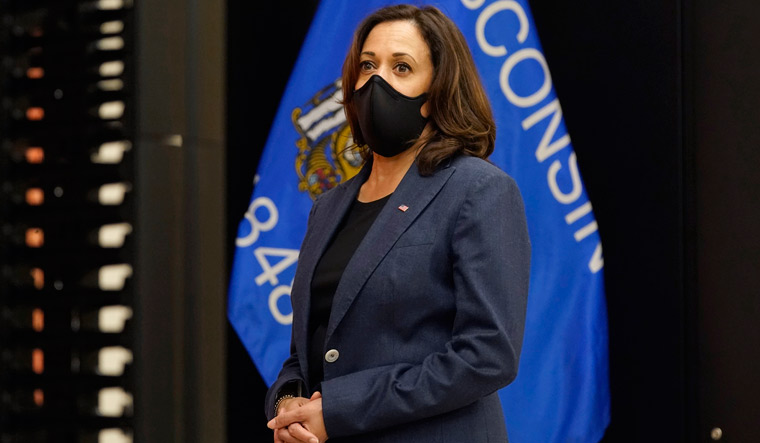Indian-origin US vice presidential nominee Kamala Harris, acting in her capacity as US senator from California in the hearings on the nomination of Amy Coney Barrett to the US Supreme Court, charged that the rush by the Republican senators to confirm Barrett into the court is an unfair run around the country's constitutional provisions in order to undo the Affordable Care Act. The Act, also known as Obamacare, is a popular health care package that Trump is bent on eliminating for the promise of a “phenomenal healthcare” replacement, which has failed to materialise in the 3.5 years of his presidency.
Speaking remotely from her senate office in the senate office building, Harris pointed out that opposing the Affordable Care Act was a Trump litmus test for nominees and charged that the president and his party are recklessly maneuvering the Supreme Court do their “dirty work”, warning that more than just healthcare would suffer with Barrett’s confirmation.
“They are trying to get a justice onto the court in time to ensure they can strip away the protections of the Affordable Care Act,” said Harris, adding that the election is already underway and “millions have voted”, questioning the fairness of a confirmation process so late in the process. (Previously Republicans refused to hold similar hearings on the confirmation of Judge Merrick Garland by former president Obama because he only had 11 months left in his term).
Harris called the hearing “an illegitimate committee process”. The committee has ignored requests to keep people safe in the middle of a deadly pandemic, she said, criticising the rushed confirmation hearing put together in just 16 days while a pandemic relief bill that would help people put food on the table languishes on the senate floor for more than 150 days. “For the moment, senate Republicans hold the majority in the senate and determine the schedule, so here we are.”
Harris reminded the hearing that, in 2017, Trump and Republicans tried to overturn the Act. “But people from all walks of life spoke out and demanded Republicans stop trying to take away the American people’s health care. Republicans finally realized that the Affordable Care Act is too popular to repeal in Congress, so now they are trying to bypass the will of the voters and do the Supreme Court do their ‘dirty work’.”
Iowa Republican senator Chuck Grassley has been dismissing warnings that Barrett would undo the Obama healthcare law as "outrageous". Noting that the Supreme Court may have to rule on the aftermath of the upcoming US elections, Harris said rushing the approval of this nomination before the election risked voting rights, workers’ rights, abortion rights, and “the very idea of equal justice”. Barrett could be on the Supreme Court when it rules on election challenges and hears the latest challenge to Obamacare on November 10, a week after the election.
Trump chose Barrett as a replacement to Justice Bader-Ginsburg just three days after the justice’s death last month. Bader-Ginsburg was often a dissenter in the conservative-majority court and the flagbearer of the court’s liberal minority. Barrett’s confirmation would solidify a lopsided conservative majority for generations.
Shifting focus to the danger the confirmation represents to the legacy of the late Justice Ruth Bader Ginsburg, Harris emphasised that the court is “often the last refuge for equal justice.” This is a refrain that began in Harris's speech on the nomination this September 28. “Few people in our history have done more to change the lives of the American people than Ruth Bader Ginsburg did as a lawyer, an advocate, and a Supreme Court Justice. And it was an inspiration and a call to each of us, for each of us to be better, to stay in the fight and stay committed to what motivated Justice Ginsburg the most, that phrase etched in the marble of the United States Supreme Court, ‘Equal Justice Under Law’.”
In the same speech, Harris began to lay out the groundwork for her remarks today. “In short, there are a few things they could do that would be more offensive to the legacy and the life of Justice Ginsburg than to return us to the full-scale policies of discrimination in healthcare toward the women of our country. But that’s what overturning the Affordable Care Act will do, and overturning the Affordable Care Act is a way a nominee gets the support of this president and his party.”
Harris and her party are outnumbered by Republicans in the senate and thus unable to do more than to point out dangers and hypocrisy, tying in-vain to delay the process with two goals in mind: To establish a record of their position and defense, holding Republicans accountable for their actions, and looking for a strategic delay that would allow late-breaking developments to postpone the rest of these hearings until after the election.
Concluding her statement, Harris rose in passion and voice taking the role of defensor of the people’s rights, her crescendo making the case that the very hearing in which she spoke was, by the nature of the Republican design, “bypassing the will of people.”



